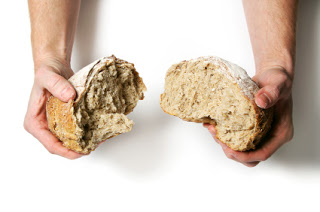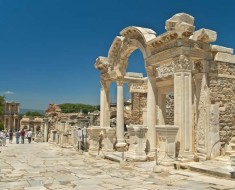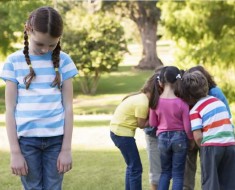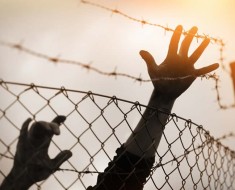Readings-
Exodus 16:2-4,9-15
Ephesians 4:1-16
John 6:24-35
‘Bread’ : stark necessity in the Exodus story; a spiritual allegory in John’s gospel.
The brute reality of hunger is there in Exodus, as the Israelites search for a new land escaping from captivity in Egypt. Things haven’t worked out quite as they expected. And they are restive and angry. We are told that the ‘whole congregation’ of the Israelites complained against Moses and his elder brother, Aaron. They find themselves hungry in no-man’s-land and have no doubt at all about whose fault it is. These escapees living in a new but as they find it, barren land, blame God’s spokesmen, rather than God himself – the activators of the whole expedition rather than the architect.
We all like to employ scapegoats. The Levesen Inquiry which has come now to its end – or at least the public side of it – has been populated by lots of people declaring themselves to be innocent and who are very keen to blame others as villains.
. ‘It wasn’t me Guv – but someone else’. We do the same. It’s the government’s fault – well often it is of course. It’s all the fault of bad parenting, or misbehaving teenagers, or the T.V., or bankers who fraud the public and line their own pockets, or tax evaders making their money in this country and keeping it offshore. Or the minister’s fault. Or God’s? We say, ‘I’ve believed all my life but somehow it hasn’t worked out as it should’, when things are going wrong. Someone else’s fault. So Aaron and Moses get it in the neck from ‘the whole congregation’.
What they are really saying is ‘God do something to remedy this situation!’ and in this story God does do something, which isn’t how it often happens when we tell him how we feel; when we are angry with his silences and lack of action.
Perhaps instead of finding substitutes we should challenge God more, tell him how we feel. When it seems God is no longer your friend, you have the greatest need to ‘draw near to the Lord’ as Moses advises his brother to tell the people. Amazing things then begin to happen, a cloud of glory, quails for food and dew that becomes bread. For us it’s all from another world, another culture; another faith. But we can hear the message – tell God how it is, and he will provide.
And how about the John story? Bread again. Jesus’ prayer, which we echo when we are together, begins with sonorous, massive statements – God is our Father, His very name is holy, there is a Kingdom that will come; His will is paramount on earth and in heaven. And then there is this basic, homely, ordinary bit –‘give us bread for today’.
A great crowd had been listening to Jesus throughout the day, they need bread too, and have been miraculously fed. We’ve had our fill of crowds in the last few days of Olympiad – excitement and disappointment too -and there’s more to come. But this is a crowd not glorifying in physical excellence but listening to words of life, not glorifying in wealth and prestige and national pride but seeking a spiritual home, needing someone to believe in. Jesus escapes from the demands the crowd make on him. We don’t know what happened overnight but in the morning some of that crowd cross the sea and when they find Jesus they ask him what his movements have been after he had slipped out of their hands. And that’s where we join the story.
Members of the crowd know their scriptures link their experience of yesterday with the story of Israelites fed with manna in the wilderness. And they talk at cross purposes with Jesus. This often happens doesn’t it in the gospels? – people (often the disciples) meaning one thing and Jesus meaning another. You can only begin from where you are, and making sense of Jesus can mean a lot of effort to get to somewhere else. Where he is. Always wanting people to think deeply he often talks in riddles. Understandable in this instance that it should be a problem to get to what he is saying. Bread is about the staff of life – not the polite bit on the side plate when you are having a meal, but for humble people the meal itself. ‘You did it once, give us this bread always’ they say to Jesus. And then the reply, which goes to the very heart of our faith.
‘I am the bread of life’.
A very, very plain, basic image of an essential part of our being – food that keeps us alive – becomes a spiritual image of our dependency on Jesus: all that he represents, the new world that he invites us into. ‘Whoever comes to me will never be hungry, and whoever believes in me will never be thirsty’. Jesus takes a very plain image to describe one that goes beyond its basic meaning and illuminates a deeper one.
Surely for us there is another message here as well. These words are more than a statement about Jesus. They are also telling us what to do. The burden of the world’s need lies heavily upon us. The sort of charities we support constantly appeal on behalf of others, so that we feel guilty when we say ‘no’ or ‘not this time’. Each of us –as well as a community of care like a local church – have to decide our response to human need. The hungry and the thirsty, the war-torn and the tortured, the oppressed and the depressed are our concern, and we are duty bound to register, to speak for and to alleviate suffering in the world. When Jesus said ‘feed my sheep’, again he was using an image to highlight our moral responsibility.
One simple thing we can do when the popular mind, the tabloid newspapers and the prime minister and members of his cabinet demonise people who are on welfare, is to speak up for them, and to speak for a nation that looks after all its citizens, but especially the least favoured and least powerful ones. Certainly there are people who abuse the system, but I guess not nearly so many as who are abused by the system. One recent poll says that 70% of the country think there should be drastic changes in the provision of welfare. If that’s the case I want to join the 30% who have a different picture of human need. I believe the temper of a nation is judged by how it regards the poor, the disabled, its children and elderly people. I don’t feel proud, despite Olympic fervour which has caught hold of many of us, to belong to a country where it’s estimated that nearly two million pensioners are living in poverty and where there are thousands of children who are not being properly fed.
And so to Paul’s letter to the Ephesians. Can we fit it into our theme this morning? Not easily. Writing from prison, his world controlled and confined by people whom we can suppose are hostile to his beliefs, he rhapsodies about the church he prays for but whose fellowship he can no longer enter and probably never will. All he’s got left is words and these words land on our lectern hundreds of years later. The words propose an ideal community of loving people, growing up, valuing each other and exercising the various gifts God is giving them. Not everyone doing the same, but devoting their skills to the mutual good. We have from Paul this abiding image of the church as the body of Christ.
Again, a physical image to affirm a spiritual truth. We are not in it – this Christian thing – for ourselves but for Jesus and because it’s for him, we are in it for others. The church not looking at itself in the mirror and saying how lovely we look, not priding ourselves on our beautiful body, but getting the body moving. If we identify ourselves by the name of Jesus, we are to live as he did. The man who ‘went about doing good’, is our vocation too, and it means that often we have to stand with people who are powerless to stand up for themselves.
We have a choice in this – we either give ourselves to building up the church – and that’s not a bad thing, or we devote ourselves, our minds, our prayers, our activity, to fulfilling Paul’s vision of a world where justice and truth reign. In my ministry now ended, I tried to do both – paid to do the first by the Methodist Church, I urged and tried to energise my congregations to do the second and hopefully in both cases the gospel was served, for surely God does not intend his church to be a bolt hole from reality but a doorway into a new world. So I have supported charities as many of us do and advocated protests and action. One such is coming up soon – a bus sponsored by Christian Aid and the Churches Campaign against Poverty, travelling around the country urging people to campaign against tax dodging. It will be at College Green in Bristol on the first Monday in September.
So this morning we have moved from the legends of Jewish beginnings as a lost people look for blame but also for bread,
to the excitement of crowds who think they may have found an answer to their poverty in a man who in himself fulfils a deeper need,
and to a first Christian community working out what it means to be living for Jesus,
and thereby we may find inspiration for ourselves.





